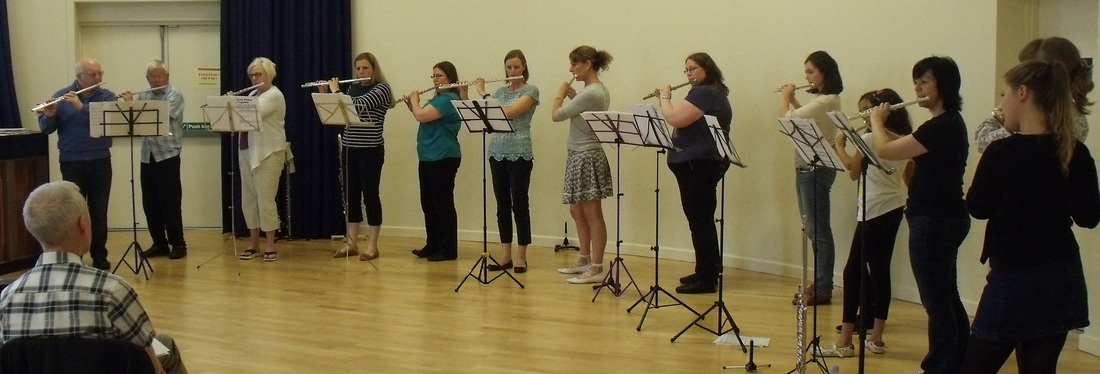|
The world of music is full of attempts to get the ‘right answer’. Just thinking about flute playing…
What’s the right way to play Bach on the flute? What’s the best make of flute? How do I play high notes quietly? What angle should I hold my flute at? Where do I put my thumb? How should I breathe? I belong to a few Facebook groups and online forums, and whenever anyone asks a question about any aspect of flute playing, strong opinions are expressed. You should definitely do it like this, hold it like this, blow like this. This make of flute is the best. People go to teachers or to masterclasses and are told to do things a certain way, and do their best to follow the instructions, and don’t understand why it’s not working for them. You buy a tutor book and it says “you must do it like this” and “you should not be doing this” (with my linguistics head on, the language of tutor books fascinates me - there's another research project in there bursting to get out one day). I am generalising here of course, for there are voices out there saying “try this”. “This works for me, so you could try it, but also you could try these different ways”. “Go and try lots of different flutes and see which one feels best to you”. Experiment. Some people go to one teacher and take what they say as gospel and never question it. Some people read everything they can on the subject, go to workshops and masterclasses and hear about many different ways to do the same thing. This can be overwhelming and confusing – who are we supposed to believe? Or it can be a springboard for experimentation, finding out what works best for you. I’ve worked on flute playing in detail with quite a number of teachers, from extended periods of lessons to one-off masterclasses or courses, so I’ve come across quite a variety of views on the way to do things. None of them, I would say, have been wrong, but some have worked better for me than others. I look at my own students and I see such variety. As a flute teacher, you spend a lot of time looking at people’s lips and hands, and there are incredible differences (thumbs, in particular, fascinate me – so many different lengths and angles they’ll bend at!). I see my job less as telling people the ‘right answer’ and more as giving them as many possible ways to try as I can. I can show you how I hold my flute with my short thumbs and my hypermobile fingers, but that won’t necessarily work for you if you have long thumbs and your fingers bend a different way. I can help you try different ways of holding it and see what’s happening with your hands when you can’t because they’re stuck out to the side of you. I can suggest a range of different ways to ‘blow’ or to position your lips, so you can try them out and see which one sounds best for you. And I understand the tendency to want to sound like someone else, flute players you admire whose sound you love, but you are you, and even doing exactly what they do (if that was possible) is unlikely to make you sound exactly like them. Your sound is made up of your physical attributes, your particular technique, your flute - and that's a good thing. If you like something about someone else's sound - the richness, for example - then play around to find out what brings about richness in your own tone. There's no 'secret' that anyone can tell you that will magically make you sound the way you want to sound. By extension, that means me reading about different approaches to playing, going to events to find out what other people are doing, and learning new things myself. For me, it also means helping flute players have access to other players and teachers, because with all the will in the world I can’t know everything or be able to demonstrate or explain everything. It’s one of the reasons why I arrange flute days. I run workshops and concerts for my students and flute choir members (pictured above just a few days ago), get-togethers where people can play in a big group, meet other players and share ideas (next one in August), and ones where I invite people with expertise in particular areas to share that with us. The next one of those is with Dr Jessica Quiñones in October – Jessica has listened to my rants, er, impassioned speeches, about the tendency to seek ‘right answers’ and has designed a day where we can “explore and experiment with a variety of methods” of approaching different aspects of flute technique. It’s so valuable to be able to take ideas from different people and try them out for yourself. It's good to meet other players and hear about their struggles with the same issues, and the things that have worked (or not) for them. To see what they do and how they sound. A lot is said in music education about ‘independent learning’ – equipping students with the skills to plan their own development and practice – and I think that’s also as much about learning to experiment with and assess other approaches, to ‘pick and mix’ and find your own way.
0 Comments
 Last week I found myself on the way to Leeds, twice. On Saturday I played with Yorkshire Wind Orchestra in the lovely surroundings of 'Arts@Trinity' - a hub of music and other artistic activity right in the busy centre of the city. We had a lively flute day with lots of visiting flute players, followed by an equally lively concert of 'Music from the Americas' inspired by the Rio Olympics. On Sunday, I felt as if I'd taken part in the Olympics (if flute playing was an Olympic sport, which after a session on the bass flute I felt it should be)! A few days earlier, I headed over to the Yorkshire College of Music and Drama, an amazing community centre for music and drama lessons, headed by principal Tim Knight. I met Tim some time ago through the wonders of the internet, but we first worked together when he wrote the fabulous 'Steel City Shuffle' for Sheffield Flute Choir. We worked on the piece over a few rehearsals, then Tim came to workshop it with us - him telling us about his inspiration for the piece, how he intended it to sound, and us advising him on what is really quite hard to do on a bass flute! The result is this tremendously fun piece for flute choir. The flute choir will be joining one of Tim's (singing) choirs, the Heritage Masterworks Chorale, for a concert in Rotherham Minster this September, and I expect the 'Shuffle' will get an outing there. This week I visited YCMD in Leeds to play through and record some of Tim's works for flute and piano. The College was a hub of activity, being the local ABRSM exam centre - and such a buzzing, welcoming place. I lost count of how many different music groups and lessons they have going on every week! Lots of Tim's work seems to be inspired by the British landscape - we played Celtic melodies, his Lakeland Suite and Moorland Suite amongst others. Being a Scottish person who spent many happy holidays in the Lake District, and now enjoys a wander out of Sheffield to the moors, this felt a bit like a musical journey through different stages of my life. The Lakeland Suite in particular makes me think of childhood holidays with my grandparents, sadly no longer with us, and of my grandad's paintings of the scenery of that area (one pictured above). You can hear some of the results of a really enjoyable morning over on Tim's YouTube channel and copies of the sheet music are available from Spartan Press. |
Keep in touch
I have an email newsletter where I share my latest blog posts, news from the flute and wider musical world, my current projects, and things I've found that I think are interesting and useful and would love to share with you. Expect lots about music and education, plus the occasional dip into research, language, freelance life, gardening and other nice things. Sign up below! Archives
July 2019
Categories
All
|

 RSS Feed
RSS Feed
